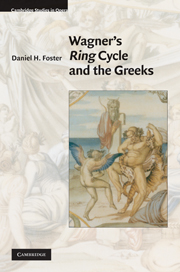Introduction
Published online by Cambridge University Press: 07 May 2010
Summary
To be able to understand the relationship between Wagner and the Greeks one must be conversant with those primary sources that Wagner read and re-read throughout his life. This seems obvious. But what does not seem so obvious, at least given the way that previous authors have approached this topic, is that one should also be conversant with the ways in which Wagner's understanding of the Greeks was influenced by secondary scholarship and scholars. And yet it is this academic research that sometimes, quite surprisingly, illuminates the murk of Wagner's prose and the peaks of his music. In fact I would argue that, as with all other modes of research, one can never really speak of the Greeks per se, much less Wagner and the Greeks, no matter how much scholars, Semele-like, may desire to gaze upon their subjects unadorned. Because even scholarship is political, one must recognize that Wagner's Grecocentrism was part of his own ideological bent as well as a larger national trend, a particular manifestation of the nineteenth-century German Zeitgeist. The way in which Wagner and his compatriots chose to dress up the Greeks says as much or more about them and about Germany as it does about Greece. But what does it say?
In his acute but all too brief appraisal of such philhellenism John Deathridge summarizes how and why Wagner and like-minded Germans used the Greeks: “from the start of his career Wagner was in thrall to the idea of the Greeks as the pristine source of a lost culture – an ideal of fundamental origins projected onto the utopian future of a society encumbered by alienated living and a lack of spiritual freedom.”
- Type
- Chapter
- Information
- Wagner's Ring Cycle and the Greeks , pp. 1 - 30Publisher: Cambridge University PressPrint publication year: 2010

